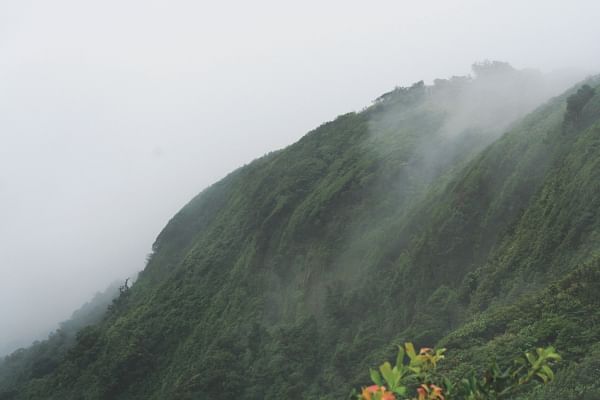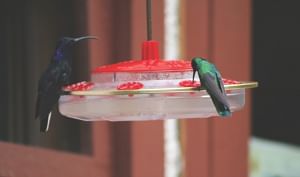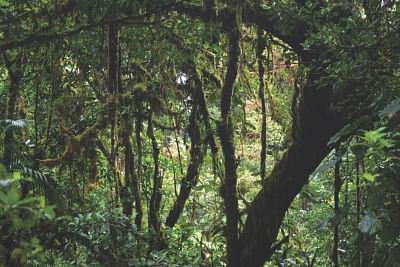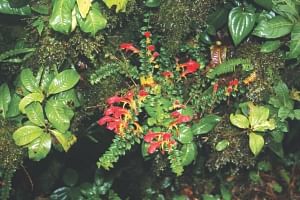| Home - Back Issues - The Team - Contact Us |
 |
| Volume 12 |Issue 08| February 22, 2013 | |
|
|
Travel
Pura Vida! By a Costa Rican Coati “I went to the woods because I wished to live deliberately, to front only the essential facts of life, and see if I could not learn what it had to teach, and not, when I came to die, discover that I had not lived.”
For a good life, take it from me, nothing will surpass a patch of pristine rainforest and a decent sized public rubbish bin. Sure, a shiny car, ultra-modern, sleek and featuring the latest ergonomics might be enough to make all the other vehicles in the traffic blush. Sure, a long, tree-lined driveway of pebbles capped by gates in swirling wrought iron might be the envy of friends. But it's not pura vida, that quintessentially Costa Rican Spanish phrase that means 'real living' or 'plenty of life', and is also used for 'hello' and 'goodbye'. Big experiences aren't necessary either. While it might be enjoyable to jet off to Cannes for the film festival now and then, to walk the red carpet; or to lounge in the Anguillan sun waiting for chilled refreshments to be brought right to your deck chair, such moments are only fleeting. Take it from a Costa Rican: keep it simple. But what would I know? I'm only a coati and for those who are not quite the mammal experts they might wish to be, think of me as a cousin of the raccoon.
I'm based up in Monteverde, which is sort of in the middle north of Costa Rica about five hours from the capital, San Jose. It's not a bad spot: the morning air is crisp and foggy as the clouds roll in over the hills and in the nights there's a wondrous chorus of insect and frog to promote blissful slumber. Tree and branch, Monteverde is rich in green, within the 26,000 acres of the Cloud Forest Reserve. You could say there's a bit of a backyard at my place. In pursuit of packaged pura vida the tourists arrive from early morning to take a stroll in our patch of forest. They've made trails for themselves with boardwalks and wooden stairs. The tourists can be noisy and nosy when they come, but we don't mind posing for their cameras, knowing that by habit in their backpacks is likely some portion of our lunch. It's a straightforward matter to take a break atop the visitor's centre roof or in a tree, to wait for the tourists to shuffle off into the greenery. I don't wish to indulge in needless nationalism but I like being Costa Rican. Well, I write 'Costa Rican' but casually we're known as Ticos, particularly the humans. We coatis are Ticos too and it's not a bad thing to be. I don't mean to bore you with facts but our Costa Rica has around 25% of its land area protected in national parks and reserves, more than any other country. Costa Rica's been recognised as the planet's greenest nation and since 2007 we've had this little goal of becoming the first carbon neutral country by 2021. I don't mean to sound proud, just because our Tico facts are impressive enough to be printed on t-shirts to sell to the tourists.
Anyway, for me and my coati friends it's rather more the 2012 ban on recreational hunting that's the favourite, because we do sport rather pretty jackets and it's not everyone who can let that be. So we retire to the tranquillity of our cloud forest, and the general dampness and breeziness, let me assure you, is not much of a bother when one has the warmth of fur to rely on. It's about dressing appropriately, nothing more. If I mention the sifting through trailhead garbage for food, my pura vida might not sound like your cup of tea. But the tourists are generous in their bread crumbs, shards of vegetables and leftover fruit. It's incredible the amount of perfectly good food scraps they discard. Better still, the rubbish bin is an ecosystem that attracts insects. It's a one-stop shop for all the nutritional requirements and the smell isn't too atrocious on account of the rainforest air. I'll tell you something else: it's tiring to wander the pristine wilds on a daily basis; much better to hang around the rubbish bins. You can think of it as recycling, as any good Tico would. Our omnivorous diet is our national contribution. Down the road a bit the tourists like to watch the hummingbirds that come, attracted by the nectar trays hung out. They're small birds, hummingbirds, of several species in Monteverde, all with delicate curved bills suited to nectar-feeding. But it's neither their size nor their shiny feathers that impress the tourists, I suppose, as much as how rapidly they can flap their little wings to hover, mid-air, while they eat, if they wish. At the other end of the scale in terms of speed are the two and three-toed sloths that tourists like to spy on night hikes. They're so slow that moss can grow on them.
In every respect Costa Rica is a wildlife haven. Being in Central America, species that developed in both the North and the South, separately, learnt to intermingle here when the land bridge formed and the landmasses joined. As I said, our cousins the raccoons prefer up north while in South America are other coati species. As a result, while our Costa Rica might account for only 0.25% of the planet's land surface it has 5 percent of the world's biodiversity, right here! Ah, but I sound like I'm boasting. I would only mention how I like living in a cosmopolitan, multi-species cloud forest society. Perhaps the most interesting aspect to our lifestyle is how attracted the foreigners have become to our Tico ways. It's not a decent habit to eavesdrop but I once heard these American girls, mid-twenties at a guess, talking about a retreat down on our Pacific coast where foreigners try to live in harmony with nature. There's no TV there and I believe as much as possible they grow their own food. I guess even in America the heritage is not only the bright lights of Hollywood, the oil tycoon tiffs of Dallas and the roulette wheels of Vegas. There's also Walden Pond in Concord, Massachusetts, where Mr. Henry David Thoreau in the nineteenth century once tried to live a pura vida of his own. That's American heritage too. A secret: Walden's back in vogue.
There'll always be critics, those who find my words too 1970s and hippy. I'd remind that if we think of the 1970s it was flower power that ended the Vietnam War. It's not an achievement to be scoffed at. Not that we could ever have a problem like the Vietnam War here in Costa Rica, because our renowned President José Figueres Ferrer constitutionally abolished our standing army in 1948, leaving more to spend on health, education and culture; making us the most peaceful and politically stable country in Central America. Neighbouring Panama followed our example in 1990 so it's catching on. There must be another tourist t-shirt in all that somewhere. I'll have to leave you there: think I smell some tourist tamale, made of corn, delicious, and there has to be some left on the plantain leaf it's wrapped in when they toss it out! Do stop by though, if you're ever lucky enough to visit Costa Rica. No appointment needed: we coatis will be right here, hanging out around the Monteverde Cloud Forest Reserve rubbish bins. Pura vida! Statistics in this piece researched on Wikipedia.
Copyright
(R) thedailystar.net 2013 |
||||||||||||||||||||





